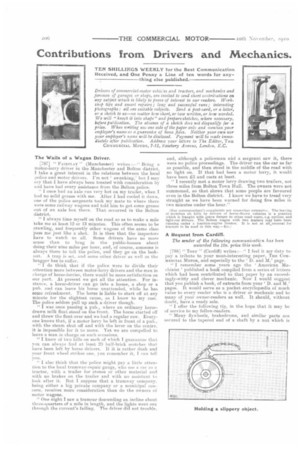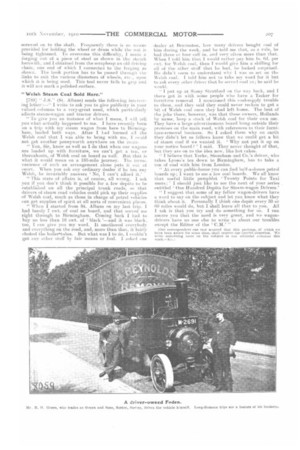Contributions from Drivers and Mechanics.
Page 18

Page 19

If you've noticed an error in this article please click here to report it so we can fix it.
TEN SHILLINGS WEEKLY for the Best Communication Received, and One Penny a Line of ten words for any thing else published.
Drivers of commercial-motor vehicles and tractors, and mechanics and foremen of garages or shops, are invited to send short contributions on any subject which is likely to prove of interest to our readers. Work. shop tips and smart repairs ; long and successful runs ; interesting photographs : all are suitable subjects. Send a post-card, or a letter, or a sketch to us—no matter how short, or how written, or how worded. We will " knock it into shape" and prepare sketches, where necessary, before publication. The absence of a sketch does not disqualify for a prise. When writing use one side of the paper only and mention your employer's name as a guarantee of bona fides. Neither your own nor your employer's name will be disclosed. Payment will be made immediately after publication. Address your letters to The Editor, Tau COMMERCIAL MOTOR, 7-15, Rosebery Avenue, London, E.C.
The Wails of a Wagon Driver.
[787] " FAIRPLAY " (Manchester) writes :—" Being: a motor-lorry driver in the Manchester and Bolton district, I take a great interest in the relations between the local polite and motor drivers. I'm not ' swanking,' but I may say that I have always been treated with consideration by arid have had every assistance from the Bolton police.
" I once had an axle run very hot on my trailer, when I had no solid grease with me. After Iliad cooled it down, one of the police sergeants took my mate to where there were some railway wagons and told him to get some grease out of an axle box there. That, occurred in the Bolton district.
" I always time myself on the road so as to make a mile take me at least 12 or 13 minutes. This often seems to be crawling, and frequently other wagons of the same class
pass me just like a shot. It is then that the inspectors have to watch us all. Some drivers have no more
sense than to brag in the public-houses about doing their nine miles per hour, and, of course, someone is always there to tell the police, and they go on the lookout. A trap is set, and some other driver us well as the bragger has to suffer.
" I do think that if the police were to divide their attention more between motor-lorry drivers and the men in charge of horse-lorries, there would be more satisfaction on our part. At present we get all the attention. For instance, a horse-driver can go into a house, a shop or a pub. and can leave his horse unattended, while he has some refreshment. The horse is liable to start off at any minute for the slightest cause, as I know to my cost, The police seldom pull up such a driver though.
" I was'once passing a pub., where an ordinary horsedrawn milk float stood on the front. The horse started off
and threw the float over and we had a regular row. Everyone knows that, if a motor lorry be left in front of a pub., with the steam shut off and with the lever on the centre, it is impossible for it to move. Yet we are compelled to leave a man in charge on such occasions.
"I know of two ?tills on each of which I guarantee that you can always find at least 20 half-brick sentches that have been left by horse drivers. If it is rather dusk and your front wheel strikes One, you remember it, I can tell you.
" I also think that the police might pay a little attention to the local tramway-repair gangs, who use a ear as a tractor, with a trailer for stones or other material and with no brakes on the trailer and with no assistant to look after it. But I suppose that a tramway company, being either a big private company or a municipal concern, receives more consideration than do the owners of motor wagons. " One night I saw a tramcar descending an incline about three-quarters of a mile in length, and the lights went outthrough the current's failing. The driver did not trouble, and, although a policeman and a sergeant saw it, there were no police proceedings. The driver ran the car as far as possible, and then stood in the middle of the road with no light on. If that had been a motor lorry, it would have been £5 and casts at least.
" I recently met a motor lorry drawing two trailers, not three miles from Bolton Town Ball. The owners were not summoned, so that shows that some people are favoured even in the Bolton district. I know we have to tread very straight as we have been warned for doing five miles in two minutes under the hour."
[Our correspondent's complaints are somewhat extensive. The leaving of scotches on hills by drivers of horse-drawn vehicles is a practice which is fraught with grave danger to other road-users, e.g. cyclists and light-ear drivers. The Balton wagon with two trailers may have been running under a traction-engine licence. It is not at all_unitsual fortractors to be used in this way.—Eml A Request from Cardiff.
The sender of the following communication has been awarded the 10s. prize this week.
f788] " TOBY "(Cardiff) writes :—" I feel it my duty to pay a tribute to your most-interesting paper, THE COMMERCIAL Moron, and especially to the D. and M.' page. " I remember some years ago the American Machinist ' published a book compiled from a series of letters which had been contributed to that paper by an exceedingly-witty and clever mechanic. Now I would suggest that you publish a book, of extracts from your D. and M. pages. It would serve as a pocket encyclopmdia of much value to every reader who is a driver or mechanic and to many of your owner-readers as well. It should, without doubt, have a ready sale.
'I offer the following tip, in the hope that it may be, of service to my fellow-readers.
" Many flywheels, brakedrums, and similar parts are secured to the tapered end of a shaft by a nut which is
screwed on to the shaft. Frequently there. is no means provided for holding the wheel or drum while tile Hof is being tightened. To overcome this difficulty, I made a forging out of a piece of steel as shown in the sketch herewith, and 1 obtained from the scrapheap an old driving chain, one end of which I connected to the forging as shown. The hook portion has to be passed through the links to suit the various diameters of wheels, etc., upon which it is being used. This tool never fails to grip and it will not mark a polished surface.
" Welsh Steam Coal Sold Here."
[7S9] " J.S." {S(. Albans) sends the following inuTesiing letter:—" I write to ask you to give publicity in your valued columns to a very-great nee, which particularly affects steam-wagon and tractor drivers.
" To give you an instance of what I mean, I will tell you what, actually happened to me. I have recently been on a trip with my steam wagon from here to Birmingham, loaded both ways. After I had burned all the Welsh coal that I was able to bring with me, I could not get another pennyworth anywhere on the route.
" You, Sir, know as well as I do that when our wagons are loaded up with furniture we can't get a. ton, or thereabouts, of Welsh coal on board as well. But that is what it would mean on a 180-mile journey. The incom venience of such an arrangement alone, puts it out of court. When you ask any ordinary dealer if he has any Welsh, he invariably answers No, I can't afford it.'
" This state of affairs is, of course, all wrong. I ask you if you don't think it possible for a few depots to be established on all the principal trunk roads, so that drivers of steam road vehicles could pick up their supplies of Welsh coal, much as those in charge of petrol vehicles can get supplies of spirit at all sorts of convenient places.
" When I started from St. Albans on my last trip. I had barely 7 cwt. of coal on board, and that served me right through to Birmingham. Coming back I had to buy no less than 16 cwt. of black '—and it was black, too, IL can give you my word. It smothered everybody and everything on the road, and, more than that, it fairly choked the boilerqubes. But what was I to do. I couldn't. get any other stuff by fair means or foul. I asked one
I ealer at Brannston, how many drivers bought coal of liim during the week, and he told me that, as a rule, he hod three hr four call in, and very often more than that. When I told him that I would rather pay him i.e. (id. per cwt. for Vi'plsh coal, than I would give him a. shilling for all of the other stuff that he had, he looked surprised.
Re didn't seem to understand why was so sot on the Welsh coal. I_ told him not to take my word for it but to ask every other driver that he served coal to ; he said he would.
"I put up at Stony Stratford on the way back, and there got, in with some people who have a 'rasher for
ore removal. I mentioned this coal-supply trouble to them, a irld they said they could never reckon to get a hit of Welsh coal once they had left home. The best of the joke there, however, was that these owners, Hollands by mime, keep a stock of Welsh coal for their own use. They have a large advertisementboard hung outside their premises on the main road, with references to their furniture-removal business. So I asked them why on earth they didn't let us fellows know that we could get a bit of steam coal if we wanted it. Why not put it up on your notice hoard f 1 said. They never thought of that, but they are on to tile idea now, like hot cakes.
I believe that Yorke, Stoneham and Co.'s driver, who takes Lyons's tea down to Birmingham, has to take a ton of mat with him from London.
At every public-house you can find half-a-dozert petrol boards up ; I want to see a few coal boards. We all know that useful little pamphlet Twenty Points for Taxi users; ' I should just like to see the next of your series , entitled One Hundred Depots for Steam-wagon Drivers.'
'1 I suggest that some of my fellow wagon-drivers have a word to say on the subject and let, you know what they think about it. Personally I think one depot every 50 or GO miles would do, but I shall leave. all that to you. All I ask is that you try and do something for us. I can assore you that theneed is very great, and we wagondrivers have no one else to write to about our troubles except the Editor of the C.M.' " Our cortosaonarnt can re-4 assured that this problem, dr which we have been aware for some time, shall receive our carefal attention. We write something anise on the subjectin cnir editorial columns this




















